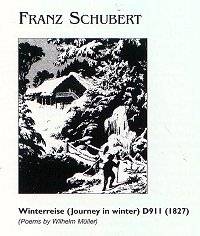
Ian Bostridge has rocketed to fame in a period which has seen many
fine singers rising to acclaim in the wake of Fischer Dieskau's domination
of the Lieder world. It is good to hear this canonic, indeed iconic, music
at the original tenor register. Bostridge has developed steadily since the
time when I was spellbound and utterly captivated by him at Sir Colin Davis's
last-but-one
Berlioz
The Trojans - with just the musings of Hylas in a single song,
he established himself in my mind as a certain future star. One is used to
famous actors stealing scenes in cameo film appearances later in their careers;
Bostridge achieved that early in his.
Three recitals, each given twice to packed Wigmore Hall, asserted Ian Bostridge's current position. The voice is darker and richer than not long ago and, belying his wan and frail appearance, he had no stamina problem in taking Winterreise straight through, without an interval and nearly without pause. Julius Drake pounced upon each next song, anxious to present it as a continuous cycle, and giving alert support on equal terms with his regular partner.

These Wigmore Hall aficionados know their Lieder word for word and note by note, so Bostridge did not have to take particular care with exaggerated diction (often essential in opera) but freed himself to concentrate on melodic shading and atmosphere. The audience contained celebrities, amongst them Alfred Brendel, whose 1986 recording with Fischer-Dieskau in the latter part of his career had just reached me for review. I liked the way Bostridge allowed himself to bend the line of Gute Nacht with just a little rubato against the heavy, steady trudge of Drake's accompaniment. He darkened his voice for Gefrorne Tranen, conveyed fierce agitation as the wind blew in his face in Der Lindenbaum, depicted the image of a frozen stream on which one could draw on the ice with a sharp stone, a raging torrent below its surface, was duly hysterical in the memories which surfaced in Rückblick, tried to maintain a surface calm in Irrlicht, but it often cracked, showed exhaustion for the Rast interlude but could find no rest, was alternately quietly reminiscent dreaming of spring (Frühlingstraum) but with violent outbursts, moods changing song by song, defiant, with manic denial, in Mut (Courage), all leading back to a steady rhythm again (too much so, for the hurdy-gurdy?) in Der Leiermann. The reception was heartfelt and no encore was anticipated nor offered.
It is not my manner to go into comparisons of numerous CDs of Schubert's song cycles (1½ columns on Winterreise in the R.E.D. catalogue); comparative reviews with 'best buy's are readily available. I cannot feel that the Philips reissue is likely to prove the 'best' of Fischer Dieskau, but it is always worth hearing the new insights be brought throughout his long career. And I am urged strongly to hear a recent version for the turn into our new century; Pregardien & Staier (fortepiano), 1997, on Teldec 06320-18824-2. The re-thinking which original instruments inspire may point the way to the next 'best' assaults upon this bastion.
The Bostridge/Drake 12 March performance of Winterreise at which I was privileged to be present will be broadcast on BBC Radio 3 on 27 March at 7.30 p.m. The sound was perfect in the critics' seats at the back of the hall; I do hope the microphones weren't too close.
Peter Grahame Woolf
 Return to:
Return to: